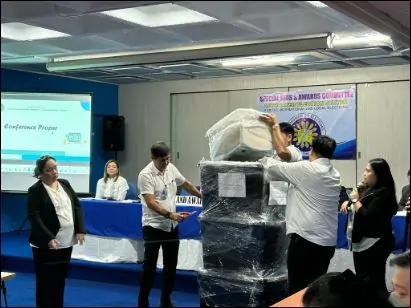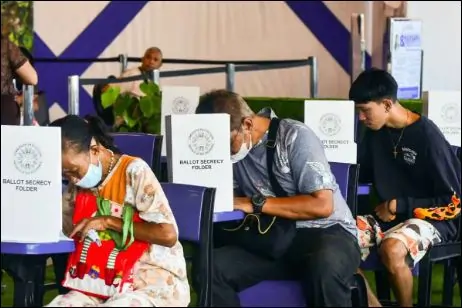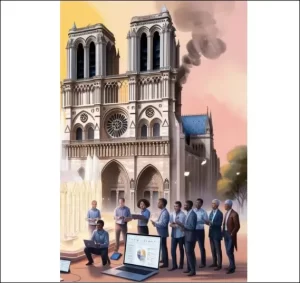
Table of Contents
Introduction: Comelec Discards 6million Ballots Reckoning P132M Loss
The Commission on Elections (Comelec) has found itself in an unprecedented situation after a ruling by the Supreme Court on Wednesday, which ordered the inclusion of five previously disqualified candidates on the May 12 election ballot.
This court decision has led to significant changes in the election process, forcing the Comelec Discards 6million Ballots to halt its printing operations and reconsider its electoral plans. While the situation may raise concerns, Comelec officials assure the public that they are in control and will continue to uphold the integrity of the upcoming elections.

Supreme Court Ruling and Its Impact on Ballots
Before the court ruling, Comelec Discards 6million Ballots and had already printed around six million ballots. These ballots, costing the Commission a staggering P132 million (P22 per ballot), were meant for the midterm elections. However, due to the inclusion of the new candidates, these ballots have been rendered obsolete.
The inclusion of the new names, along with the required updates to the ballot system, forced the temporary halt of printing operations, a scenario that has never been seen before in the history of Philippine elections.
The Comelec Response: Adjustments and Contingency Plans
Despite the setback, Comelec Chair George Erwin Garcia expressed confidence that the situation would not derail the election process. “We will proceed with the automated election, as required by law. The Comelec is committed to democracy and will always adhere to the law,” Garcia stated.
To ensure the smooth continuation of preparations, the Commission has developed a comprehensive contingency plan, or “Plan B,” which includes updating its Election Management System (EMS) to accommodate the changes and ensure that the printing process continues without further delays.
The P132 Million Loss: Comelec Discards 6million Ballots
The six million ballots already printed—comprising test ballots, overseas ballots, and regional ballots—will now be discarded. This decision is necessary because the ballots did not include the names of Zubair Mustapha and other candidates who secured a temporary restraining order (TRO) from the Supreme Court.
The ballots’ disposal is not without concern, and Comelec has invited the Commission on Audit (COA) to oversee the process, ensuring transparency and preventing any misuse or tampering with the discarded ballots.
Updated Election Timeline and New Printing Process
With the updated requirements, Comelec has set a new printing schedule. Garcia confirmed that printing could resume as early as January 20, 2025, with the goal of completing all 73 million ballots by April 14, 2025. To expedite the process, Comelec is exploring the possibility of utilizing additional printing machines from the National Printing Office (NPO).
The EMS will also be updated to include more than 1,000 new ballot templates, ensuring that all candidates, including the five previously disqualified, are properly listed.
The Legal Implications: TROs and Disqualified Candidates
While the TROs have caused a significant disruption, Comelec remains committed to respecting the Supreme Court’s decision. The disqualified candidates who secured TROs include Edgar Erice, Charles Savellano, Chito Balintay, and Florendo Ritualo Jr.
These candidates are running for local positions, and the ballots for their respective areas had not yet been printed. The court’s intervention, however, has brought attention to the issue of “nuisance candidates,” with some claiming that these individuals are merely trying to sow confusion.
Proposed Legislation on ‘Nuisance’ Candidates
In response to the disruption caused by nuisance candidates, a bill has been filed in the House of Representatives seeking to impose criminal liability on those who run with the intent to confuse voters.
Rep. Ruth Mariano-Hernandez of Laguna believes that candidates who file certificates of candidacy that mimic the names of well-known officials should be disqualified and face legal action. The bill aims to prevent unnecessary delays and ensure the integrity of the electoral process.
Conclusion
The Comelec’s quick response to the Supreme Court’s ruling highlights its commitment to conducting free and fair elections. Although the situation is unprecedented, the Commission’s action plan and the disposal of six million ballots albeit costly demonstrate its dedication to maintaining electoral integrity.
The adjustments, alongside the new printing processes, ensure that the elections will proceed as scheduled. The public can remain confident that Comelec will continue to manage this situation in a transparent and efficient manner.
FAQs
Why were the ballots discarded?
The ballots were discarded because they did not include the names of five candidates who were recently reinstated by a Supreme Court ruling. The ballots must be reprinted to comply with the law.
How much did the Comelec Discards 6million Ballots cost?
The discarded ballots cost P132 million, with each ballot priced at P22.
What steps is Comelec taking to ensure the election proceeds on time?
Comelec has developed contingency plans, including utilizing additional printing machines and updating its Election Management System to accommodate the changes. Printing will resume on January 20, 2025, with the goal of completing the ballots by April 14, 2025.
What happens if a candidate receives a TRO after ballots are printed?
In such cases, Comelec will update the ballots accordingly and, if necessary, discard previously printed ballots. This process, while costly, ensures compliance with court rulings.
Disclaimer
The information in this article: Comelec Discards 6million Ballots Reckoning P132M Loss is based on official statements from the Commission on Elections (Comelec) and current legal proceedings. The events described are subject to change as new developments arise.
Readers are advised to follow official sources for the latest updates. The views expressed in this article are for informational purposes and do not necessarily reflect the views of the publisher.
TechWirings does not endorse or explicitly support any views or actions expressed in this content.










